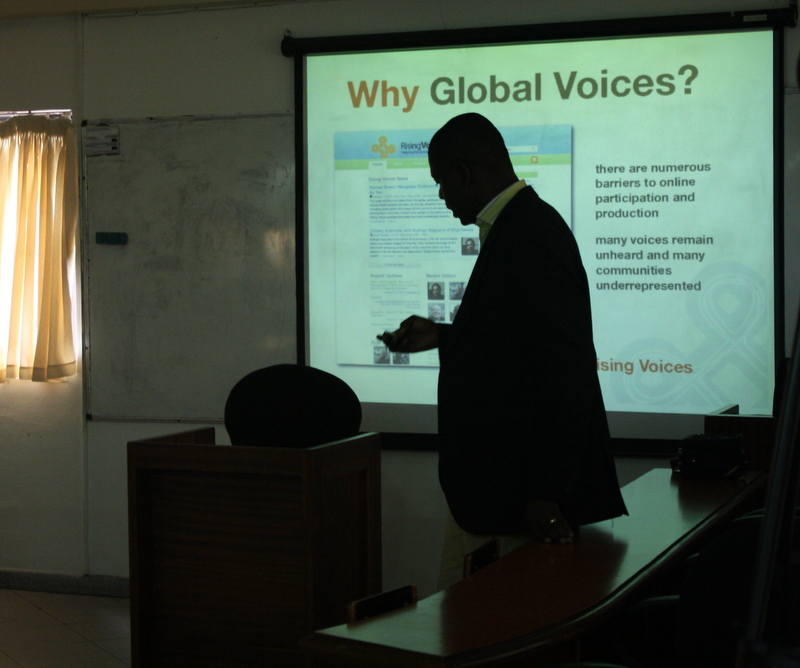
Participants at the Lagos #GVMeetUp. Photo by Kosi Ibekwe. Used with permission.
Social media has pushed the traditional gatekeepers of information aside and upped the immediacy with which news is reported. This has empowered many people to voice their views and share their experiences, giving the world a wealth of perspectives that might have otherwise gone unheard, but it often can be difficult to establish the credibility of a news item.
This was the crux of the conversation at the first Nigeria #GVMeetUp [1] held at the School of Media and Communication of Pan Atlantic University [2] in Victoria Island, Lagos on April 17, 2014. Global Voices Online curates and provides context to netizens’ conversations around the world, so verifying information found on social media is of particular concern to its writers and editors.
Many people on the Internet spread falsehoods without meaning to, Global Voices Managing Editor Solana Larsen [3] said, speaking to the meetup in a prerecorded video presentation. It's often the case that they “do not understand how information shows up on the Internet or how they accidentally take part in spreading misinformation”.
As such, the first step in verification of information from social media is to estimate the credibility of the netizen. According to Larsen, this is built upon trust. If a user lacks a credible voice, then invariably whatever news comes from them cannot be trusted.
Philosophy of @globalvoices [4] is to look for local voices online. – Solana #GVMeetUp [5]
— Olufemi Bellos (@FemiBellos) April 17, 2014 [6]
Dr. Eugene Ohu of the Lagos Business School stressed that there are various players to take into account: the witness (a social media user, news curator or citizen journalist), the amplifiers (those who have many followers and distribute news or influence news consumption) and validators (those netizens who judge the value or content of a news item).
Dr Eugene Ohu speaking at @globalvoices [4] @SMC_PAU [7] #GVMeetUp [5] @LBSNigeria [8] pic.twitter.com/yky92OkoOp [9]
— SMC (@SMC_PAU) April 17, 2014 [10]
Ohu said citizen journalists must possess certain characteristics, such as a natural skepticism. Before accepting a news item, they try to assess the source. “As such the credibility of the source is essential” in determining the veracity of the news, he said.
“A good citizen journalist should only amplify news when he or she has authenticated the source,” Ohu said. When in doubt, he or she can crowdsource by asking followers who know more or are in the location of the event to validate the news story. He added that communicating with a source should always be done with tact, finesse and loads of courtesy, and citizen journalists should accept mistakes and apologize when they are wrong.

Lagos #GVMeetUp at School of Media and Communication. Photo by Kosi Ibekwe. Used with permission.
In the end, netizens can either spread facts or fallacy. And in Web 2.0 where the division between news producer and news consumer is ever blurred, tact is essential in validating the veracity of news on social media platforms.
Talk today at the #GVMeetup [11], and the work @globalvoices [4] is doing to represent citizen voices in today's media landscape. Impressive work.
— KT (@baroka) April 17, 2014 [12]
Earlier today at the #GVMeetUp [5]. And @tonypox [13] vexed! cc @FailedRift [14] @gbengaosowe [15] @greatise [16] @Divinepee [17] @WordsworthGwary [18] pic.twitter.com/i45Dl92NrO [19]
— Nwachukwu Egbunike (@feathersproject) April 17, 2014 [20]
Following the Lagos Global Voices #MeetUp, its dozen participants were more convinced about their power in producing news, but nonetheless went home pondering the grave responsibility that this power has conferred on netizens in Nigeria’s blogosphere.